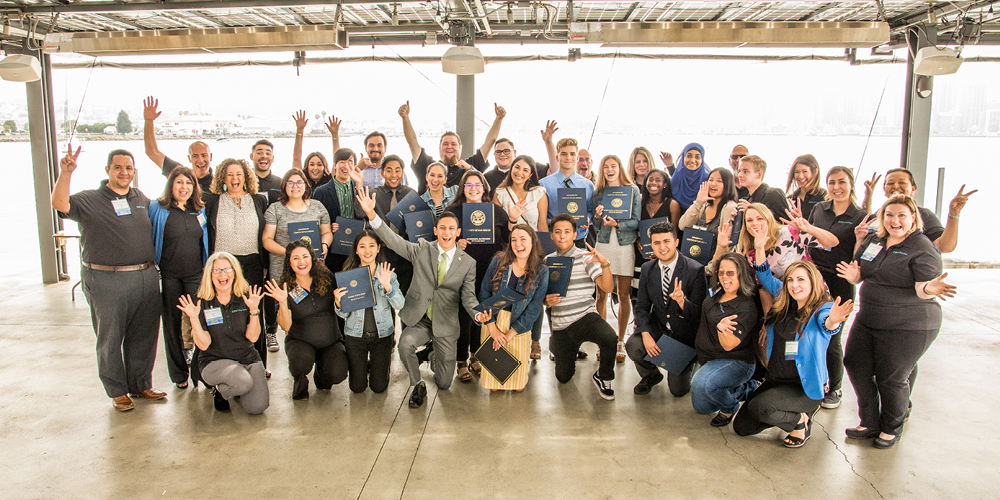Did you know seven in 10 U.S. corporate funders increased their charitable contributions in response to COVID-19?
Or that 65% of companies offered to change nonprofit grant purposes to redirect funds to the most immediate needs?
Or that 54% of corporations offered grant extensions to nonprofits during COVID-19?
The Voice of Corporate Philanthropy in Response to COVID-19 Worldwide report makes it clear that corporate philanthropy is on the rise. Companies are doing more than ever to provide support.
Looking ahead, 43% of corporate leaders say they intend to revise their disaster relief strategy, and 26% intend to expand their employee engagement programming. Are either of those corporate philanthropy strategies right for you and your company? If you’re ready to implement or refresh your corporate philanthropy efforts, understanding the basics is a good place to start.
Download the Custom Corporate Giving Guide
Corporate Philanthropy Definition
According to the Council on Foundations, corporate philanthropy refers to the investments and activities a company voluntarily undertakes to responsibly manage and account for its impact on society. Philanthropic investments and activities include:
- Money
- Donations of products
- In-kind services
- Technical assistance
- Employee volunteerism
- Other business transactions
The purpose of these investments and activities is to advance a social cause, issue or the work of a nonprofit organization. Corporations often feel it is their social responsibility to give back, building a positive culture and workplace within their companies. They often want to show gratitude and give back to the communities that have helped make them profitable. While revising your disaster relief strategy might be one action to consider, you can expand your corporate giving much further than that.
7 Types of Corporate Philanthropy
The seven most common forms of corporate philanthropy are:
- Matching Gifts: Companies financially match donations that their employees make to nonprofit organizations.
- Volunteer Grants: Companies provide monetary grants to organizations where employees regularly volunteer.
- Employee & Board Grant Stipends: Corporations award grants to employees and/or public boards to donate to the nonprofit of their choice.
- Community Grants: Company programs award nonprofit organizations that apply for grants based on defined criteria.
- Volunteer Support Initiatives: Companies partner their employees with nonprofits to provide specialized support.
- Corporate Sponsorships: Companies provide financial support to a nonprofit that in return acknowledges that the business has supported their activities, programs or events.
- Corporate Scholarships: Corporations provide scholarship dollars to universities on behalf of students seeking support to continue their studies, encouraging college education and workforce development.
Benefits of Corporate Philanthropy
Companies with successful corporate giving strategies publicly live the values of their organizations and in return benefit from high employee engagement, employee retention and the ability to attract top talent.
Corporate philanthropists also see a more positive work environment, increased employee engagement, a boost to their company’s public image and brand equity, enhanced customer relationships and consumer confidence as well as strengthened government relations.
With benefits like these, it’s no surprise that some of the most successful corporations in the U.S. heavily invest in corporate philanthropy, including Coca-Cola Company, which offers a $20,000 employee matching opportunity, and Walmart, which provides $250 to employees for 25 volunteer hours.
Approaching Corporate Philanthropy with Advised Funds
Local companies in San Diego County have been enhancing their corporate giving through corporate-advised funds.
An advised fund is a charitable vehicle that offers flexibility and personalization, allowing companies to engage employees and make a strong philanthropic impact. With advised funds, companies can give gifts of cash, stock, real estate or other assets to the fund, which is managed by a charitable sponsor organization, like a community foundation.
As the charitable assets grow under the stewardship of advisors and investment managers, companies grant the funds to nonprofits. Corporations recommend when to give grants, how much and who will receive the funds.
San Diego companies that have adopted the corporate-advised fund approach at San Diego Foundation (SDF) include Hologic, Qualcomm, Viasat, WD-40 Company, Cox Communications, H.G. Fenton Company and more. SDF also acts as an advisor providing insights to the community’s challenges and needs, and directing corporations to resources, best practices and nonprofits that will support the focus areas desired by the company.
Most recently, the WD-40 Company Memory Making Fund granted $189,000 to seven nonprofit programs positively changing lives in San Diego.
In partnership with SDF, WD-40 Company employees created a grant program to address the root causes of economic instability in order to give more San Diegans a pathway to prosperity and achieve full independence. Through the WD-40 Company corporate-advised fund, employees invested in solutions that helped individuals and families pull themselves permanently out of poverty.
If your company is just beginning to consider how to give or you’re already making a difference in the community, SDF is here to help you further your philanthropic goals. Contact our Director of Development & Stewardship Cami Mattson at cami@sdfoundation.org or (619) 814-1385 to learn more.
Or, download our Custom Corporate Giving Guide today.
Download the Custom Corporate Giving Guide
Our Custom Corporate Giving Guide teaches you the basics of building and sustaining a successful corporate giving program that unlocks benefits for your employees and your brand.





